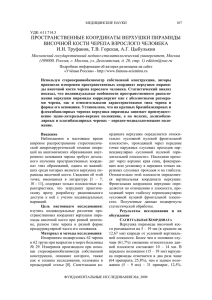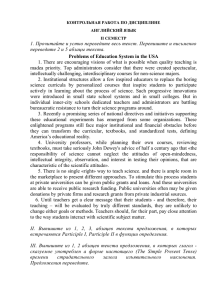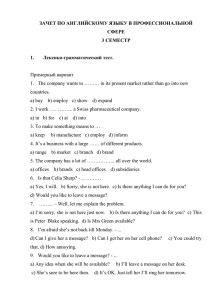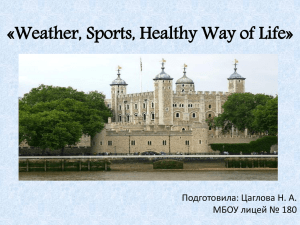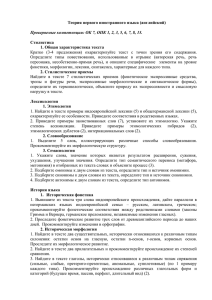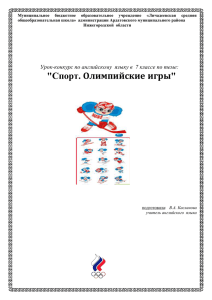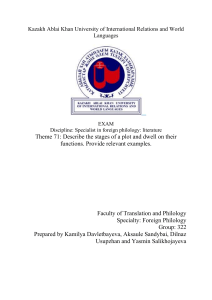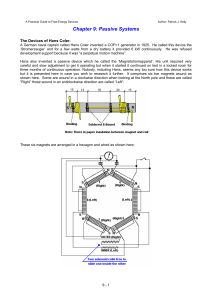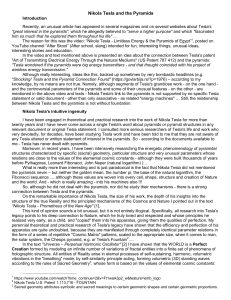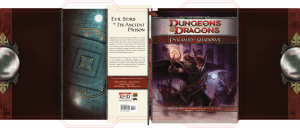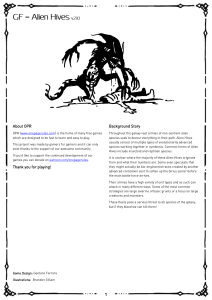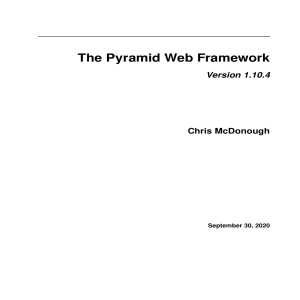Дайте развернутые ответы на вопросы по тексту (выполняется
advertisement
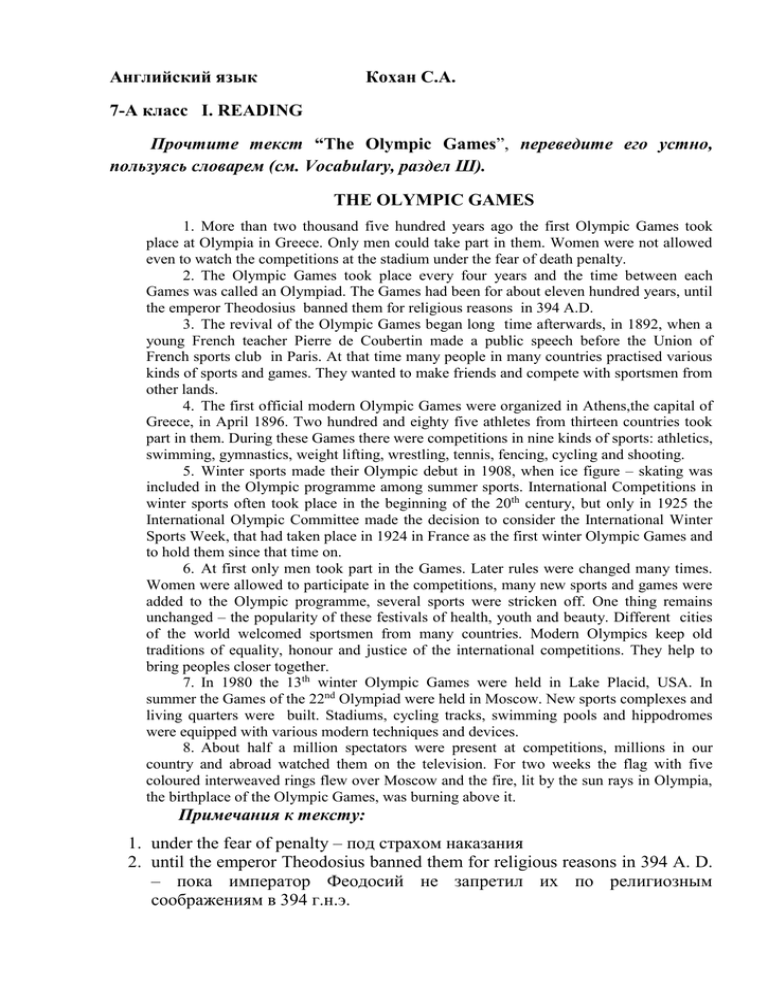
Английский язык Кохан С.А. 7-A класс I. READING Прочтите текст “The Olympic Games”, переведите его устно, пользуясь словарем (см. Vocabulary, раздел Ш). THE OLYMPIC GAMES 1. More than two thousand five hundred years ago the first Olympic Games took place at Olympia in Greece. Only men could take part in them. Women were not allowed even to watch the competitions at the stadium under the fear of death penalty. 2. The Olympic Games took place every four years and the time between each Games was called an Olympiad. The Games had been for about eleven hundred years, until the emperor Theodosius banned them for religious reasons in 394 A.D. 3. The revival of the Olympic Games began long time afterwards, in 1892, when a young French teacher Pierre de Coubertin made a public speech before the Union of French sports club in Paris. At that time many people in many countries practised various kinds of sports and games. They wanted to make friends and compete with sportsmen from other lands. 4. The first official modern Olympic Games were organized in Athens,the capital of Greece, in April 1896. Two hundred and eighty five athletes from thirteen countries took part in them. During these Games there were competitions in nine kinds of sports: athletics, swimming, gymnastics, weight lifting, wrestling, tennis, fencing, cycling and shooting. 5. Winter sports made their Olympic debut in 1908, when ice figure – skating was included in the Olympic programme among summer sports. International Competitions in winter sports often took place in the beginning of the 20th century, but only in 1925 the International Olympic Committee made the decision to consider the International Winter Sports Week, that had taken place in 1924 in France as the first winter Olympic Games and to hold them since that time on. 6. At first only men took part in the Games. Later rules were changed many times. Women were allowed to participate in the competitions, many new sports and games were added to the Olympic programme, several sports were stricken off. One thing remains unchanged – the popularity of these festivals of health, youth and beauty. Different cities of the world welcomed sportsmen from many countries. Modern Olympics keep old traditions of equality, honour and justice of the international competitions. They help to bring peoples closer together. 7. In 1980 the 13th winter Olympic Games were held in Lake Placid, USA. In summer the Games of the 22nd Olympiad were held in Moscow. New sports complexes and living quarters were built. Stadiums, cycling tracks, swimming pools and hippodromes were equipped with various modern techniques and devices. 8. About half a million spectators were present at competitions, millions in our country and abroad watched them on the television. For two weeks the flag with five coloured interweaved rings flew over Moscow and the fire, lit by the sun rays in Olympia, the birthplace of the Olympic Games, was burning above it. Примечания к тексту: 1. under the fear of penalty – под страхом наказания 2. until the emperor Theodosius banned them for religious reasons in 394 A. D. – пока император Феодосий не запретил их по религиозным соображениям в 394 г.н.э. 3. Pierre de Coubertin – Пьер де Кубертен 4. to hold them since that time on – проводить их с этого времени постоянно 5. long time afterwards – спустя много лет II. EXERCISES 1.Определите значение следующих интернациональных слов из текста. Olympic, stadium, penalty, religious, public, club, sportsman, gym nastic, tennis, programme, Committee, popularity, festival, modern, tradition, million, television, flag, organize. 2. Подберите английские эквиваленты (колонка А) к русским словам и выражениям (колонка В). A 1. to take part 2. for religious reasons 3. various kinds of sports 4. to compete 5. to keep traditions 6. winter sports 7. figure-skating 8. sports complexes 9. living quarters 10.five coloured rings B 1. состязаться 2. принимать участие 3. фигурное катание 4. спорткомплексы 5. пять разноцветных колец 6. зимние виды спорта 7. поддерживать традиции 8. жилые кварталы 9. по религиозным соображениям 10.различные виды спорта 3.Выпишите из текста все неправильные глаголы и дайте их три формы. 4. Поставьте вопросы к подчеркнутым словам: 1) The first Olympic Games took place in Greece. 2) Winter sports made their Olympic debut in 1908. 3) Modern Olympic Games keep old traditions of honour and justice of the international competitions. 6. Переведите письменно следующие предложения из текста, обращая внимание на сказуемое в пассивном залоге. Later rules were changed many times. Women and girls were allowed to participate in the competitions, many new sports and games were added to the Olympic programme, several sports were stricken off. New sports complexes and living quarters were built. 7. Дайте развернутые ответы на вопросы по тексту (выполняется письменно). 1) When and where were the first official Olympic Games organized? 2) What kinds of sports did these Games include? 3) What decision was made by the International Olympic Committee in 1925? 4) Why does the popularity of the Olympic Games remain unchanged? 5) What do you know about the winter Olympic Games held in our country? 8. Пользуясь словарем, переведите письменно 3-й абзац текста. III. VOCABULARY to take part competitions revival to make a speech to make friends weight lifting wrestling fencing cycling make debut to participate to strick off welcome honour justice to bring closer track swimming pool to equip spectator to be present interweaved rings to light (lit, lit) to burn (burnt, burnt) принимать участие состязание, соревнование возрождение произносить речь подружиться поднятие тяжестей борьба фехтование велоспорт дебютировать участвовать вычеркивать приветствовать честь справедливость сближать дорожка бассейн оборудовать зритель присутствовать переплетенные кольца зажигать гореть IV. TEST I. Соедините подходящие по смыслу части предложений. 1. The revival of the Olympic Ga-mes a) was burning above Moscow. began in 1892… 2. People wanted to make friends and b) when Pierre de Coubertin made a compete… public speech before sports clubs. 3. Modern Olympic Games… c) keep traditions of the international competitions th 4. The 13 winter Olympic Games… d) with sportsmen from other lands 5. For 2 weeks the fire of the Olympic Games… e) were held in Lake Placid, USA II.Укажите номера абзацев, которые содержат информацию для ответов на следующие вопросы: a) В каких видах спорта состязались участники первых официальных Олимпийских Игр в Афинах? b) Где проходили летние Олимпийские Игры 1980 года? c) Какие изменения произошли в проведении Олимпийских Игр на протяжении их существования? III. Прочтите следующие утверждения и определите, являются ли они согласно тексту верными(T), неверными(F) или не обсуждаются вообще(N). 1. Ice figure-skating was included into Olympic Programme in 1910. 2. 3. 4. 5. The first Olympic Games took place at Olympia. Russian athletes took part in the Olympic Games in 1952 for the first time. The Olympic Games were banned by the emperor Theodosius in 394 A.D. Millions people in our country and abroad had no chance to watch Olympic Games in Moscow. IV. Расположите следующие предложения в таком порядке, чтобы получилось краткое изложение текста. 1. Winter sports made their Olympic debut in 1908. 2. Many new sports and games were added to the Olympic programme. 3. Many people in many countries practised various kinds of sports and games and wanted to compete with sportsmen from other countries. 4. Modern Olympic Games keep old traditions of equality, justice and honour. 5. The Olympic Games took place every four years and the time between them was called an Olympiad. GRAMMAR Раскройте скобки, употребляя глаголы в Present Continuous или Past Continuous 1.I (to write) an English exercise now. _______________________________________________________________ 2. I (to write) an English exercise at this time yesterday. _______________________________________________________________ 3. My little sister (to sleep) now. _______________________________________________________________ 4. My little sister (to sleep) at this time yesterday. _______________________________________________________________ 5. My friends (not to do) their homework now. They (to play) volley-ball. _______________________________________________________________ 6. My friends (not to do) their homework at seven o'clock yesterday. They (to play) volley-ball. _______________________________________________________________ 7. You (to eat) ice-cream now? _______________________________________________________________ 8. You (to eat) ice-cream when I rang you up yesterday? _______________________________________________________________ 9. What your father (to do) now? _______________________________________________________________ 10. What your father (to do) from eight till nine yesterday? _______________________________________________________________ 11. Why she (to cry) now? _______________________________________________________________ 12. Why she (to cry) when I saw her yesterday? _______________________________________________________________ 13. She (to read) the whole evening yesterday. _______________________________________________________________ 14. She (not to read) now. _______________________________________________________________ 15. Now she (to go) to school. _______________________________________________________________ 16. What you (to do) now? —-I (to drink) tea. _______________________________________________________________ 17. You (to drink) tea at this time yesterday? — No, I (not to drink) tea at this time yesterday, I (to eat) a banana. _______________________________________________________________ 18. My sister is fond of reading. She (to read) the whole evening yesterday, and now she (to read) again. _______________________________________________________________ 19. Look! My cat (to play) with a ball. _______________________________________________________________ 20. When I went out into the garden, the sun (to shine) and birds (to sing) in the trees. ____________________________________________________________ 9-A,9-Б классы I. READING Прочитайте текст «Languages of the world», переведите его устно, пользуясь словарем (см. Vocabulary, раздел III). LANGUAGES OF THE WORLD 1.Nobody knows what the first language was. But scientists feel sure that nobody speaks it today because all languages change and keep on changing as long as people use them. One language may change in different ways in different places and grow into several languages. 2.If we could meet the people who spoke English five hundred years ago, we probably couldn′t understand much what they said. 3.English itself is a mixture of several languages. Scientists believe that these languages and many others all grew out of the same language which they call Indo-European. Nobody speaks it now. But some of its descendants are Latin, German, English, French, Greek, Russian and many of the different languages spoken in India. 4.Britain and America were once described as nations divided by a common language. Just what is difference between the English spoken in Britain and America? 5.The first English settlers to reach America arrived in Virginia in 1607 and in Massachusetts in 1620. They all spoke English of the early seventeenth century – the language of Shakespeare and Milton. Most of them came originally from the south and south-east of England. Although some of them had spent some years of exile in Holland they spoke with the accents of the southern part of their home country. To a large extent they kept that form of speech, but they soon learned to give old words new uses. They also took words from the local Indian languages for plants and animals that were new to them. 6.Until the Declaration of Independence in 1776 over two-thirds of the settlers in what later became the U.S. came from England. After that date many other people came to make a new life for themselves in the New World. These included Irish, French, Germans, Dutch, Italians, Slavs, and Scandinavians. All these people gave new words to the language of North America. The Negroes who had been taken from Africa as slaves to work on the rice and cotton plantations added words and structures from their own native languages. Some people today think that the very American expression O.K. comes from a similar expression which was brought to America by the Negroes. 7.All these people contributed in various ways to the language which was to become American English. Most civilizations and cultures – in their writings, traditions, folk stories – have traces of the old language. Примечания к тексту 1. feel sure that … полностью уверены, что… 2. keep on changing продолжают изменяться 3. just what так что же 4. in what later became the U.S. которые позднее вошли в состав США I. EXERCISES. 1. Найдите в тексте антонимы к следующим словам: different, last, leave, nobody, north, small, new, give, dependence, few, exclude, therefore. 2. В колонке В найдите русские эквиваленты к английским словам в колонке А. А В because в большой степени that пока as long as так как as well as хотя some of так же как, а также once между as некоторые из between когда-то although как to a large extent что 3. Найдите в тексте слова, имеющие сходные корни с русскими словами ниже: Запомните их значения в английском языке. дивиденды, дата, декларировать, микстура, фольклор, культ, коммуна, плантация, ассимиляция, цивильный. 4. Переведите письменно следующие предложения из текста, обращая внимание на сказуемые в пассивном залоге. 1. Britain and America were once described as nations divided by a common language. 2. The Negroes who had been taken from Africa as slaves added words and structures from their own native languages. 3. Some people think that the very expression O.K. comes from a expression which was brought to America by the Negroes. similar 5. Дайте развернутый ответ на вопросы по тексту. (выполняется письменно) 1. Do people in Britain and America speak the same language? 2. What words did the first English settlers take from local Indian languages? 3. What peoples gave new words to the language of North America after 1776? 4. What is English now? 6. Пользуясь словарем, переведите письменно четвертый абзац текста. III.VOCABULARY change use several probably describe difference settler trace until reach arrive originally spend (spent) exile extent keep (kept) keep on include slave bring (brought) scientist language sure descendant grow (grew, grown) way изменение; изменяться использовать несколько вероятно описывать отличие поселенец след до тех пор, пока (не) достигать прибывать, приезжать первоначально проводить (время) ссылка, изгнание степень сохранять продолжать включать раб приносить, привозить ученый язык уверенный потомок расти; увеличиваться дорога; путь, способ IV. ТEST I. Соедините подходящие по смыслу части предложений. 1. Scientists feel sure that … 2. One language may change … 3. The first settlers … 4. There are … 5. Most civilizations and cultures … a.spoke English of the 17th century. b. nobody speaks the first language now. c. in different ways in different places. d. have some traces of the old language. e. some of descendants of Indo-European in use now. Укажите номера абзацев текста, которые содержат информацию для ответа на вопросы ниже: а. Каково происхождение английского языка по предположениям ученых? в. Смогли бы мы понять людей, говоривших на английском языке 500 лет назад? с. Под влиянием каких языков формировался английский язык, на котором говорит современная Америка? I. II. Прочитайте следующие утверждения и определите, являются ли они согласно тексту верными (Т), неверными (F) или не обсуждаются вообще (N): 1. English as well as many other languages grew out of the same language. 2. If you met the people who spoke English five hundred years ago, undoubtedly you could understand what they said. 3. Britain and America were once described as nations divided by a common language. 4. The Egyptian king Psammetichos decided to learn which of the world′s languages was the oldest. IV. Расположите следующие предложения в таком порядке, чтобы получилось краткое изложение текста. 1. Scientists believe that English as well as some other languages all grew out of the same language. 2. American English, for example, differ in various ways from the English language spoken in Britain. 3. But all languages kept on changing as long as people used them. 4. It may be explained by the fact that a number of nations contributed to the language which was to become American English. 5.It is called Indo-European. GRAMMAR Откройте скобки, используя глаголы в нужном времени : 1 A I ..have seen.... (see) three films this week. I haven't seen any, I'm afraid. 2 A Where is Jack? B He.............(go) to the park with Paul. 3 A I haven't seen Tom for a long time. B I know. He..............(study) a lot since September. 4 A John paid for the cinema tickets last night. B Really? He................(be) very generous these days. 5 A The children are exhausted. B They..............(play) for hours, that's why. 6 A I had a very bad day at work yesterday. B So did I. First, the computer..........(break down) and then I.............(spill) coffee on some papers. 7 A Has Arthur retired now? B Yes. He..............(work) for the same company for forty years when he decided to retire. 8 A Where are the children? B Oh, Stan...............(take) them to the zoo. 9 A Have the Smiths moved yet? B Actually, they ............(move) next Saturday. 10 A.............(you/recognise) that man over there? B No. I don't think I've ever seen him before. 11 A Shall we stay in tonight? B Actually, I .............(go) to my friend's birthday party. 12 A Do you want to come to the cinema with me? B Yes, but remember, I.............(not/like) horror films. 13 A I found a ring while I .............(plant) a tree yesterday. B Really? Can I see it? 14 A Life..............(be) a lot better fifty years ago. B I agree. People ...............(have) more fun. 15 A I.............(try) to phone you since this morning. B Oh, I have been out shopping with my sister. 16 A Why are you annoyed with Jason? B Because he..............(always/forget) important things. 17 A The orchestra played very well last night. B Yes. They..............(practise) together for weeks before they held the concert. Выберите правильный вариант: 1 'What do you do for a living?' 'I ...... portraits of famous people.' A am painting В paints C paint 2 'Did you find Tom?' 'Yes. He............in his study when I found him.' A worked В was working С works 3 'Where...............when you went to London?' 'In a small family hotel.' A were you staying В did you stay С do you stay 4 'Did you speak to Kate on the phone last night?' 'Yes, but I............. for ages before I finally got through.' A am trying B have been trying С had been trying 5 'Could you take the rubbish outside for me, please?'' 'I..................it.' A have already done В already do С had already done 6 'Where is your brother?' 'He.............in the garden, I think.' A is playing В plays С played 7 'Do you see Catherine very often?' 'We...............for lunch twice a month.' A have met В meet С are meeting 8 'What are you doing?' 'I.............for the recipe I want to use tonight.' A looked В look С am looking 9 'Why is Linda so tired?' 'She..............very hard recently.' A works B is working С has been working 10 'You're very late. Where have you been?' 'Well, I..........home from work when the car broke down. A was driving В am driving С drove 11 'Have you got your exam results yet?' 'Yes. I................all of them.' A am passing В passed С pass 12 '................your homework yet?' 'No, I'm still busy doing it.' A Have you finished В Are you finishing С Do you finish 13 'Sorry I'm late. ..............very long?' 'No, only five minutes.' A Are you waiting B Do you wait С Have you been waiting 10 класс I. READING Прочитайте текст «Pyramid power», переведите его устно, пользуясь словарем (см. Vocabulary, раздел III). PYRAMID POWER 1.As the story goes, a Frenchman, Antoine Bovis, first noticed these powers while exploring the Great Pyramid in Egypt during the 1920s. He saw the bodies of small animals which had wandered into the Pyramid and died. Instead of decomposing, as would be expected, these bodies had dehydrated and mummified. On returning to France he conducted a series of experiments with model pyramids and discovered, for instance, that steak was still quite edible and tasted good after being left under a pyramid for several months. 2.Bovis′ discoveries were taken up by the Czechoslovakian Karl Drbal in the 1950s. He found that pyramids could affect non-organic matter as well as organic matter. A razor blade, for example, never became blunt if placed under a pyramid. Even blunt razor blades placed under a pyramid for a few hours became sharp. Drbal found that one razor blade could be used up to 200 times or more if kept under a pyramid. He also discovered that the position where his razor blades sharpened best corresponded to the position of the King′s Burial Chamber in the Great Pyramid – directly under the apex one-third of the way up. Drbal patented a Pyramid Razor Blade Scharpener in 1959 and small red and white plastic pyramids appeared on the market soon afterwards. 3.Since then American researchers have discovered many more powers of the pyramid. A recent claim is that meditation is facilitated and enhanced if done under a pyramid or wearing a pyramid as a hat. Like razor blades, old and dry tobacco can be revived under model pyramids. In fact, the list of pyramid experiments is endless but here is one of the things I have tried with pyramids. 4.I tried placing pyramids above plants to see if growth was helped by pyramid powers. I had two identical avocado plants so I placed a pyramid over one but not the other. The plant with the pyramid over it has grown faster and healthier than the other plant. To revive the weaker plant I tried watering it with water which I had left under a pyramid for a few days: sure enough the plant sprouted new leaves and began to look much healthier until I started watering it with ‘untreated’ tap water again. 5.Despite all the experiments with pyramids there is still no scientific explanation for their powers. All you can do is build your own model pyramid and see if it works for you, like it did for me. See, for instance, if pyramids can sharpen blunt knives and scissors as well as razor blades or find out if a pyramid can preserve perishable food or milk. The only way to find out if you believe in this strange inexplicable power is to try the experiments for yourself. Примечания к тексту 1. as the story goes говорят, что 2. as would be expected как следовало ожидать 3. take up возвращаться к чему-л., обратиться вновь 4. King′s Burial Chamber место погребения царя (короля) 5. one third of the way up одна треть расстояния II. EXERCISES 1. Найдите в тексте производные от следующих слов, переведите их и распределите на две группы по частям речи (1 – существительные, 2прилагательные) eat, discover, pose, research, meditate, end, grow, identify, science, explain, perish. 2. Найдите в тексте слова, имеющие сходные корни с русскими словами. Определите, к какой части речи они относятся. мумия, кондуктор, моделировать, позиция, патент, маркетинг, медитация, идентифицировать, ватерлиния, экспериментировать, пресервы (полуконсервы). 3. Составьте словосочетания по модели определение + существительное, используя подходящие слова из двух колонок. А - существительные В - определения pyramid, animals, bodies, steak, organic, non-organic, model, matter, blade, claim, plant, leaves, mummified, blunt, sharp, perishable, water, explanation, knives, food edible, scientific, strange, tap, new, old, weak, healthy, recent, best, small, plastic, great 4. Составьте предложения из слов, данных в произвольном порядке. a) b) c) d) e) pyramids, non-organic, organic, affect, both, matter, and. the bodies, had mummified, of, small, instead of, animals, decomposing. even, much, sharper, if placed, a pyramid, razor, blades, became, under, blunt. of, an, endless, list, pyramid, there is, experiments, in fact. for, give, but, all, no, scientific, the experiments, powers, explanation, pyramid. 5. Переведите письменно следующие предложения из текста, обращая внимание на инговые формы глагола с предлогами или союзами. a) Antoine Bovis first noticed the pyramid powers while exploring the Great Pyramid in Egypt in the 1920s. b) Instead of decomposing, the bodies of animals had dehydrated and mummified. c) A recent claim is that meditation is enhanced if wearing a pyramid as a hat. d) On returning to France he conducted a series of experiments with model pyramids. e) Steak tasted good after being left under a pyramid for several months. 6. Дайте развернутые ответы на вопросы письменно. 1) When did small plastic pyramids appear on the market? 2) What fact was Antoine Bovis much interested in while exploring the Great Pyramid in Egypt? 3) What is scientific explanation for pyramid powers? 7. Пользуясь словарем переведите письменно четвертый абзац текста. III. VOCABULARY. notice power explore body wander decompose expect discover steak leave (left) find (found) find out affect matter blunt sharp razor blade place correspond directly apex appear afterwards research замечать свойство, способность, возможность исследовать тело, организм бродить разлагать(ся) ожидать открывать бифштекс оставлять находить узнавать воздействовать вещество тупой острый лезвие бритвы помещать соответствовать непосредственно, прямо вершина появляться впоследствии исследовать recent facilitate enhance wear like only revive model food if growth avocado fast weak water; tap water sprout leaf (leaves) treat explanation perishable preserve недавний, последний (о времени) способствовать, содействовать усиливать носить (об одежде) подобно единственный оживлять макет, модель пищевой продукт если рост (о растении) авокадо (вид груши) быстрый слабый вода, поливать; водопроводная вода давать ростки лист (листья) обрабатывать объяснение скоропортящийся сохранять (о продуктах) IV. TEST I. Соедините подходящие по смыслу части предложений. 1. Bovis′ discoveries… a) were taken up by Karl Drbal in the 1950s. 2. A razor blade never became b) a Pyramid Razor Blade blunt… Sharpener in 1959. 3. He found that one razor blade.. c) if placed under a pyramid. 4. Drbal patented… d) began to look much healthier. 5. The plant sprouted new leaves e)could be used up to 200 times and… or more. II. Укажите номер абзаца текста, который содержит информацию для ответа на следующие вопросы. а) Что обнаружил Карл Дрбал, проводя эксперименты с пирамидами? в) Какой опыт был проведен автором с целью изучения возможностей пирамид? с) Кто продолжил исследования в этой области после Бовиса и Дрбала? III. Прочитайте следующие утверждения и определите, являются ли они согласно тексту верными (Т), неверными (F), или не обсуждаются вообще (N). 1. He tried placing pyramids under plants to see if growth was helped by pyramid powers. 2. Small red and white plastic pyramids appeared on the market shortly before Drbal patented his Pyramid Razor Blade Sharpener. 3. The plastic pyramids provided energy using the same principle as the Great Pyramid in Egypt. 4. Despite all the experiments with pyramids there is still no scientific explanation for their powers. IV. Расположите следующие предложения в таком порядке, чтобы получилось краткое изложение текста. 1. His discoveries were taken up by K.Drbal from Czechoslovakia. 2. Antoine Bovis, a Frenchman, was the first to begin making experiments with model pyramids in the 1920s. 3. K. Drbal patented his discovery in 1959. 4. He found that pyramids affected non-organic matter as well as organic matter. 5. However, there is no scientific explanation for the pyramid powers. 6.Since then American researchers have discovered more powers of the pyramid. GRAMMAR повторить Reported Speech Переделайте предложения из прямой в косвенную речь: 1 Robert said,' This film is very funny'. ...Robert said (that) the film was very funny... 2 'I'm starting a new job next week,' she said. 3 'I got my exam results last week,' he told them. 4 'I can't afford to buy this dress,' said Sally. 5 'I would buy a car if I had enough money,' he said to her. 6 Frank said, 'That's the house where I was born.' 7 ' That was a wonderful party,' said Jill. 8 'Oranges grow in hot countries,' the teacher says. 9 'A lot of people visit museums,' he said. 10 'This is a very famous statue,' the tour guide told us. 11 'I don't like that jacket,' said Bob. 12 'I'm lost,' the boy said. 13 'I may be a little late this evening,' she said. 14 'You'd better clean up this mess,' Mum said to Claire. 15 'I've already done the shopping,' she said. 16 'I found this note under the sofa,' said Sue. 17 'I won't be late again,' he said to us. 18 'If I finish work early, I'll call you,' she said. 19 'I've been training hard recently,' he told the reporters. 20 'Shall I make some tea?' said Zoe. 21 'We must go home now,' said the man to his children. 22 'Those are the boys who chased me,' Sarah said. 23 'I'm going to a party tonight,' Lynne told her friends. 24 'I used to have long hair,' Laura said. 25 'There is too much violence on TV,' says Grandad. 26 'You ought to make a decision soon,' Andrew told her.
